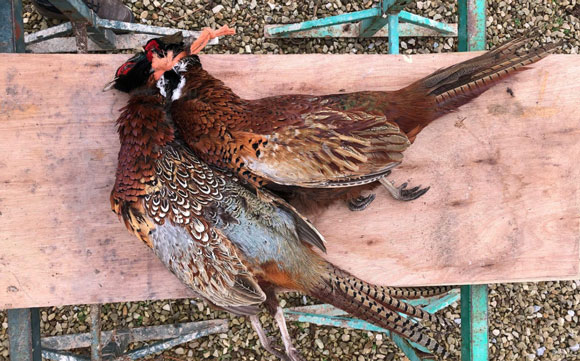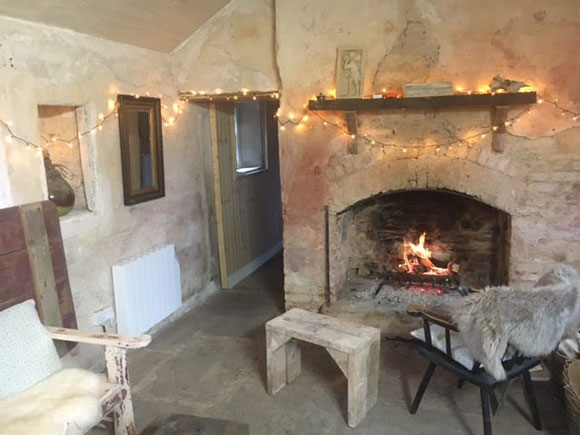‘In the bleak midwinter
‘Frosty wind made moan,
‘Earth stood hard as iron,
‘Water like a stone…’
Christina Rossetti
The birds hung there for four days.
They had such beautiful feathers…gold, brown, red, and blue. But their necks were cocked at an unnatural angle, inasmuch as they were hanging by a string from a nail in the garage.
‘Shouldn’t you pluck them and clean them?’ we asked Elizabeth.
‘No…they should hang first.’
|
|
| Source: Elizabeth Bonner — Our pheasants. |
And so, they remained where they were. Hung by the neck…like criminals. Each time we passed, they seemed to reproach us. ‘We were pretty to look at. And we never did you any harm. And yet, you let us hang, like Mussolini and his lover.’
Christmas came softly to the Emerald Isle while much of the US was enjoying a white Christmas, with some of the lowest recorded temperatures.
My colleague Dan Denning lives in Laramie, Wyoming where the wind was sweeping over the plain and the temperature was falling below zero.
‘Dan, you need an in-ground house’, we suggested.
The Earth is always around 55 degrees. Dig down three feet and it never gets too hot or too cold. We learned the trick from Karl Hess, speechwriter for Barry Goldwater. It was he who wrote those immortal words:
‘Extremism in defense of liberty is no vice. Moderation is no virtue.’
‘The weather where you’re from seems horrible’, a man delivering gas opened a conversation. ‘I don’t see how you stand it.’
‘Well, it’s not like that all the time. We only get a storm like that one every few years. And we’re prepared for it.’
While we were exaggerating the prudence of the American people, it was 10:00am and as dark as Baltimore at midnight. Wind and rain flew against our faces. The delivery man didn’t seem to notice.
‘I guess the weather is why you’re here. It’s very mild in Ireland.’
Extreme threats
‘Very mild’, means different things to different people. It was 50 degrees as these words were exchanged…just as it is most of the rest of the year. But unlike the summer months, it was dark. The Irish do not freeze…not like they do in Montana; instead, they are severely deprived of Sunlight.
On rainy days, which is almost all of them, the Sun never rises and never sets. It gets progressively lighter…until noon…and then the light fades again.
Karl probably overstated the benefits of extremism. Out on the high plains…or in the high politics of Washington, DC, extremism may make things more interesting…but it is also a threat.
Later, fed up with Washington, Karl became a welder and built his own Earth-sheltered house in West Virginia. When we visited, we were enchanted. It was partially dug into a hill, with a glass wall on the South side.
‘I built this house for $11,000’, he told us proudly. ‘And the only heat I have is from the Sun…and this wood stove.’
Ever since, we’ve been fascinated by cheap, efficient houses. Not just cheap to build but also cheap to live in.
We were later intrigued by the ‘Earthship’ houses — built by an old friend out of tires and mud — in Taos, New Mexico. We decided to try it ourselves, but without old tires or the mud. Instead, we used ferro-cement, concrete reinforced with steel. It was the first house ever built like that in Maryland. And the last.
Maryland is not New Mexico. And the climate of the West — dry, with fairly large swings in temperature — is very different to the long sultry summers along the edges of the Chesapeake Bay.
Nevertheless, the house is a marvel…wisteria blocks the Sun in the summer…and lets it come in to heat up the house in the winter.
‘I was in that last weekend’, reported a friend. ‘I think someone left the heat on. I couldn’t figure out how to turn it off.’
‘Uh…there is no heat’, we explained.
It’s heated by passive solar…preserved by the deep Earth. You can’t turn it on…or off.
But here in Ireland, we found an entirely different project. When we bought our house, we found that it had the ruins of four more houses. One of them looked like it might be resurrected. The roof had fallen in, but the walls were still standing, more or less intact.
People spend a lot of money on housing. Some people can’t afford it. They are ‘bums’, ‘homeless’ people, or ‘unhoused’ people, depending on your politics.
And yet, in some places — with some imagination and elbow grease — housing can be remarkably cheap.
Deep and dark
This is the first time we have spent Christmas in Ireland. Our family is spread out…between the US and Europe. Usually, we return to the old family farm in Maryland for the holidays. But this year, we decided to make it easier on the European contingent of the family…especially our son and his growing family in Dublin.
Those are the circumstances which led us to go through the winter in these northern latitudes. And herewith, a little memoire of ‘nollaig shona’, Christmas in Ireland, 2022.
The holiday began a few days before the family arrived.
‘Don’t go in there’, we said to Elizabeth, trying to protect her delicate sensibilities. She had just come from a visit to the neighbours, where she was given two dead birds.
‘They were shot by a poacher. He gave several of them to Jim [the neighbour]. He gave us a couple.’
‘Do you know how to pluck and clean them?’
‘No, but I’ll look it up on YouTube.’
They were beautiful animals. Pheasants are raised by the thousands at a nearby farm, and then released. Hunters pay good money to blast away at them, killing hundreds at a time.
‘I don’t see the sport in it’, Jim had commented earlier. ‘They’re practically tame.’
Some of them get away. Like refugees, they make their way to our property…pecking at bugs and seeds…and happy to be alive.
The two hanging in the garage survived the general slaughter. But then, the poacher got them.
‘Why does Jim call him a poacher?’ we asked.
‘McCreedy?’
‘Is that his name?’
‘Yes, he came to our door too and asked to hunt on our property. I asked Jim. He said that if it was McCreedy we were best off giving him permission. Because he’ll hunt anyway. He’s a poacher. Apparently, everyone knows it. But if you give him permission, he’ll give you some of the meat.’
The Christmas spirit
In the library was a chimney sweep, bent to his work, but exposing a ‘plumber’s crack’ as deep and forbidding as the headwaters of the Nile, which is why we suggested to Elizabeth that she stay out.
He was a jolly man, with a large torso mounted on very narrow hips, and a fleshy face topped by hair that had gone grey but been dyed grey, probably at home…perhaps while watching a soccer match.
‘Ah ghan gimtchsmal’, he had said on his arrival.
We presumed he was speaking English, but we had no idea what he meant to say. Seeing his chimney brushes in his left hand, though, we showed him to his work…and gradually began to comprehend his dialect.
‘You’re not getting up on the roof?’
‘Noo…tat wool only poosh it dune an make it moor compact.’
His method was to run brushes up from the fireplace. We had tried that ourselves, without success. But he knew his business. When he encountered the same obstacle we did, he changed the brush for a sort of claw, and rammed it so hard up the chimney that, when it finally broke through, it knocked the wire chimney cap off. And then, ‘whoosh…and thump’…a large bird’s nest, along with chunks of brick and ceramic chimney liner fell into the fireplace. Dust rose in a cloud.
‘I tink we got it’, said our man, Liam Daley.
We had set up a Christmas tree in the library. We needed the fireplace to work. Three sons, one daughter-in-law, and one grandson were coming. We had to be ready for them. Mr Daley did the job, charging us 60 euros.
Things are expensive in Ireland. But the cash-and-carry local economy can be surprisingly cheap. Mr Daley thought he was overcharging us. But he had come out from the city, brought his tools with him, and spent the best part of the morning at the house. 60 euros — just a little more than US$60 — seemed reasonable.
The work completed, we escorted Mr Daley up the road to the aforementioned cottage. It has a main fireplace, with a chimney that has a straight shot to the outside. But a second small fireplace in the bedroom runs in a dog’s leg pattern to meet up with the main chimney on top of the roof. This second chimney was clogged. Again, Mr Daley cleaned it out and charged us another US$20.
|
|
| Source: Bill Bonner |
Celtic nan
Now, at least, we were ready for company. Our house is small — with three bedrooms. And the rooms are small, it would be hard to add another cot. So the youngest of our sons would stay at the cottage.
‘You’re the first person to stay here since Nan Donovan died’, we told him.
‘Nan Donovan was old when we were young’, Jim explained.
‘She lived alone in that house, with no electricity, no heat, no running water, no toilet, and dirt floors. But that was the old Ireland. People were poor. It was only after we joined the European Union and became the “Celtic Tiger” that people had any money. And by then, Nan was in her grave.
‘I remember walking home from school…this was the 1960s…we walked to school back then…and Nan would stand at her gate, waiting for us to come by. She just wanted someone to talk to. But we were not very nice about it; we just wanted to get home. So, we were probably rude…or unfriendly; I don’t remember.
‘But then, Nan died about 40 years ago…and the house was abandoned. The roof caved in, I guess it was about 20 years ago. And I thought I’d never see smoke from that chimney again.’
We were showing the house to him and his daughter-in-law, who were out for a walk on the road. The fire was burning bright. And our son had hung up ‘fairy lights’, which took the edge off of our LED kitchen lamp. He had also put on some contemporary music. So the house was warm and welcoming.
More to come…
Regards,
 |
Bill Bonner,
For The Daily Reckoning Australia
l Bonner,
For The Daily Reckoning Australia



